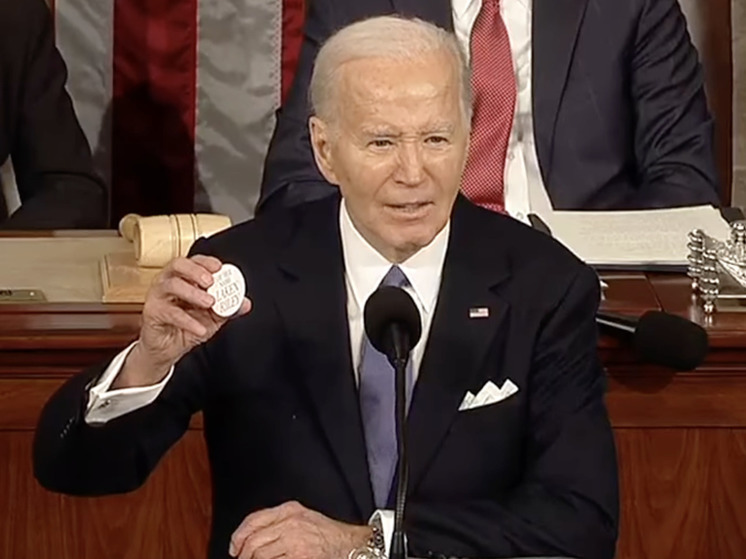Only Moscow itself can help Moscow – and a little luck
Recently, Western media and political analysts have developed a new trick: to declare numerous videos in which Joe Biden appears as a modern-day analogue of Leonid Brezhnev in his final years as a clear demonstration of Russia's insidious machinations, which allegedly uses deepfake technology to denigrate the American president. But the debates of the US presidential candidates that took place allow us to draw only one of two conclusions: either the «Kremlin hackers» were so successful that they were able to hack a live broadcast of CNN, or Biden really is an analogue of Brezhnev in the era of the sunset of this general secretary's career. A resounding, fantastic failure — this is how even his most ardent supporters assessed Biden's behavior and physical condition during the debates. However, why am I trying to find the right words? They have already been found by others.
Here is a list of headlines from the New York Times columnists, a newspaper that hates Trump with every fiber of its being (if, of course, the media can have a soul): «Joe Biden is a good man and a good president. He should drop out of the race», «Is Biden too old? America has its answer», «President Biden, it's time to go». Joe Biden is now Moscow's main antagonist and opponent on the planet. And if we follow the logic of the «zero-sum game» (what's bad for your opponent is good for you), then the failure of the current US president is good for Russia. But, alas, such linear logic does not work here at all.
Biden and Trump of the summer of 2024 have almost nothing in common – except, perhaps, their shared conviction: “Russia is bad, Putin is bad.” Trump on VVP’s recently put forward conditions for ending the conflict in Ukraine: “No, they are unacceptable.” Biden on Putin: “He says he wants to restore the Soviet empire. He doesn’t want part of Ukraine, he wants all of Ukraine. He won’t stop there if he takes Ukraine. What will happen to Poland, Belarus, the NATO countries?”
One can, of course, try to draw some far-reaching conclusions from Trump's antipathy to Zelensky, which was clearly evident during his presidential term and has not disappeared in the intervening years: «Every time Zelensky comes to this country, he leaves with 60 billion dollars. He is the greatest salesman in history.» Or here's another: «Ukraine is not winning this war… The money that is spent on this war, we should not spend… And I will stop this war between Putin and Zelensky as president, as a presidential candidate.» We've heard it, we've seen it, we don't believe it anymore.
There is such a wonderful criterion for testing the truth of any theory as practice. And here is what this criterion tells us in this case: rhetoric is rhetoric, but the general mood of Trump's past presidential term was exclusively anti-Russian. Trump claims that Zelensky is «the greatest salesman in history.» Wrong, categorically wrong: «the greatest salesman» is Trump himself. But in matters concerning Russia, the Republican presidential candidate has nothing except the ability to «sell himself to voters.» Under President Trump, the US administration's course towards Moscow was formulated and implemented by others. Sometimes the hapless president still managed to get hold of the helm. I remember, for example, how his then national security adviser, a hawk of hawks in the sphere of foreign policy, John Bolton, had to convey to Putin an invitation to visit Washington on behalf of Trump.
So where is this visit? Nowhere. It did not take place and, I am sure, will never take place. If elected again as US President, Trump will again become just a window dressing, an external facade. Real policy will be made by people fully included in the framework of the anti-Russian consensus that is characteristic of the political elite of the Republican Party, and the leadership of the intelligence services, and all other elements of what is commonly called the deep state. Sometimes this consensus, however, can make surprising turns. Let us recall, for example, the situation in Washington at the beginning of this year: wanting to spite Biden and his fellow party members, the Republican leaders put Zelensky on a starvation diet.
But now the Kyiv «feeding trough» is full of «food» again. And it is hard to believe that Washington will give Moscow such a «gift» again. We must be realistic and not expect the impossible. What can we expect then?
The main intrigue now is, of course, Biden's fate: will the Democrats change their presidential candidate? Nothing like this has ever happened in American history (in 1972, the Democrats had to urgently replace the vice-presidential candidate, but a person with the prefix «vice» is still not president).
However, neither the outcome of this intrigue, nor even the outcome of the elections will change the main thing: the Americans will not voluntarily compromise with Moscow on Ukraine — only under pressure. Volodymyr Zelensky in Brussels at the end of this week: «Ukraine does not want to prolong the war, we do not want it to continue for years. We must put a settlement plan on the table within a few months.»
Zelensky's «peace plans» are a bit of a waste of time. But the very idea that «Ukraine does not want to prolong the war» (it does not want to — clearly not because life is good) is intriguing — much more intriguing than even the consequences of the current American presidential debates.


